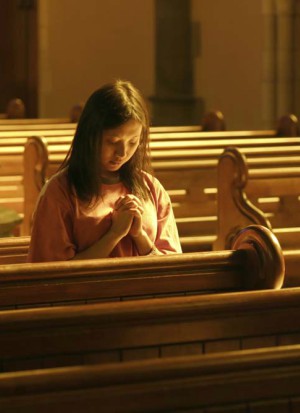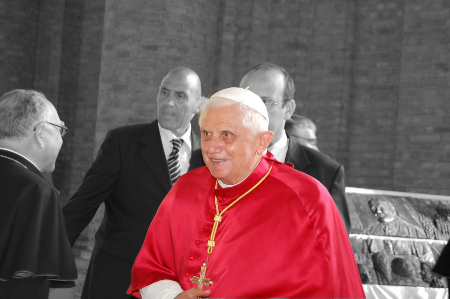We ask you, humbly: don't scroll away.
Hi readers, it seems you use Catholic Online a lot; that's great! It's a little awkward to ask, but we need your help. If you have already donated, we sincerely thank you. We're not salespeople, but we depend on donations averaging $14.76 and fewer than 1% of readers give. If you donate just $5.00, the price of your coffee, Catholic Online School could keep thriving. Thank you.Help Now >
MONDAY HOMILY: Lord, Increase Our Faith!
FREE Catholic Classes
What is faith? Where does it come from? How does it increase?
Highlights
Catholic Online (https://www.catholic.org)
11/13/2012 (1 decade ago)
Published in Year of Faith
Keywords: Faith, Catholic, homily, daily homily, daily Scripture, Gospel of Luke, St. Theresa, Sugar Land, Fr. Stephen B. Reynolds
SUGAR LAND, TX (Catholic Online) "Increase our faith!" The apostles sound something like a group of students who are studying calculus for the first time. Overwhelmed by the demands of the subject matter, they cry out for help and relief from their teacher.
"Increase our faith," the apostles implore the Lord. We echo their request. Lord, increase our faith. Strengthen us to believe and to live the faith we have received.
The apostles were wise to ask for growth in the power to believe. Jesus had been teaching them the importance of vigilance. Being ever watchful, living in the presence of God, is essential for the Christian whose daily struggle for faithfulness can sometimes resemble a spiritual battle.
Jesus had also been instructing the apostles on the imperative of forgiveness, among the most difficult battles in the Christian life. If your brother "wrongs you seven times in one day and returns to you seven times saying, 'I am sorry,' you should forgive him" (Luke 17:3-4). No wonder the apostles wanted more faith. They recognized that without God's help they could do nothing.
What is faith? Where does it come from? How does it grow within us?
Faith is first and foremost a gift of God. We cannot acquire it on our own, through our own efforts or through any human power. "Faith is a gift of God, a supernatural virtue infused by him" (Catechism of the Catholic Church, no. 153).
Faith is also a human act, in that it requires a response on our part. "In faith, the human intellect and will cooperate with divine grace" (CCC, no. 155). The apostles, who had already been given the gift of faith, recognized its limit within themselves and asked the Lord for the grace to respond more generously to His invitation to believe.
We must take care to distinguish faith as a supernatural virtue from religious feelings or sentiment arising from devotion. Faith is not the equivalent of religious ardor, although it may contribute to it.
Faith is a virtue, a habit of the soul, which disposes the person to surrender their mind and heart to God. St. Paul calls this free submission of intellect and will "the obedience of faith" (Romans 1:5; see CCC, no. 143).
Although self-surrender may go against our instincts, it is the path to true freedom and the source of liberation for our mind and will. God is the source of all truth, goodness and beauty. To be rooted in him through the obedience of faith opens the mind to what is true, the will to what is good, and the whole person to what is delightful.
There will be times when our faith seems weak. We may experience a loss in confidence in God due to suffering or difficult circumstances. The moral and social decline that surrounds us can cause dismay and incomprehension. We may sometimes ask, "Where is God?" when confronted with tragedy, injustice or interior aridity.
To experience these things does not mean that we lack faith. It may mean, however, that we have come up to the limits of our faith, to its frontier in our hearts. We can't see beyond the present horizon because our faith doesn't extend too far beyond the present moment.
One those occasions, we ought to imitate the apostles, saying to the Lord, "increase our faith," and have confidence that he will, even if we don't perceive that intensification right away.
We cannot help but to recall the faith of the Mother of God. "Blessed is she who believed that there would be a fulfillment of what was spoken to her from the Lord" (Luke 1:45). We also believe, and beg the Lord to expand the boundaries of our faith, after the pattern of His holy Mother.
-----
Fr. Stephen B. Reynolds is pastor of St. Theresa Catholic Church in Sugar Land, Texas, a suburb of Houston. You may visit the parish website at: www.SugarLandCatholic.com.
---
'Help Give every Student and Teacher FREE resources for a world-class Moral Catholic Education'
Copyright 2021 - Distributed by Catholic Online









 Daily Readings for Thursday, April 18, 2024
Daily Readings for Thursday, April 18, 2024 St. Apollonius the Apologist: Saint of the Day for Thursday, April 18, 2024
St. Apollonius the Apologist: Saint of the Day for Thursday, April 18, 2024 Aspiration: Prayer of the Day for Thursday, April 18, 2024
Aspiration: Prayer of the Day for Thursday, April 18, 2024


